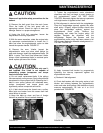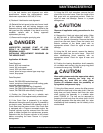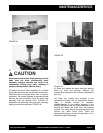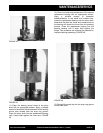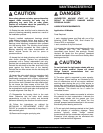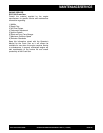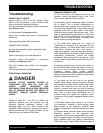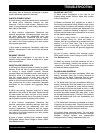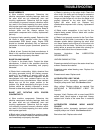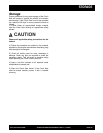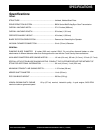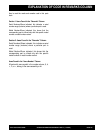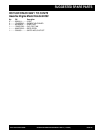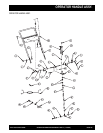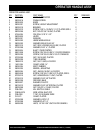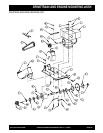
RCC130H-CRACK SAW OPERATION AND PARTS MANUAL REV #1 (11/18/04) PAGE 41
TROUBLESHOOTING
BLADE WOBBLES
a) Worn machine components. Determine that
machine components including bearings, belts and
the arbor shaft are not excessively worn and
requiring replacement. Determine that the engine
runs smoothly to prevent harmonic vibrations which
can result in the blade impacting the work surface
with impulse type loads. Inspect the hub body flange
and hub flange for material accumulations. Keep all
surfaces clean and flat. Always replace any
questionable component with a factory replacement
part only.
b) Improper blade operating speed. Determine that
the blade is being operated within the industry
recommended RPM speed range. Engine RPM
should be checked periodically with an electronic
tachometer to ensure proper operational speed for
the blade.
c) Blade is bent. Contact the blade manufacturer. A
blade in this condition should be discontinued from
use immediately and properly discarded.
BLADE BLANK DAMAGE
a) Cracks in the blade blank. Contact the blade
manufacturer. A blade in this condition should be
discontinued from use immediately and properly
discarded.
b) Blade blank undercutting. Highly abrasive fines
are being generated during the sawing process,
resulting in an abrading or wearing away of the
blank faster than the diamond segments. Blades
manufactured with wear resistant blanks can be
specified from many manufacturers. Wear resistant
blanks may not be the proper solution to the
problem. Any blade experiencing this type of wear
problem should be carefully inspected in shorter
intervals to determine proper structural integrity.
BLADE NOT ROTATING WITH PROPER
CONCENTRICITY
a) Worn machine components. Determine that
machine components including bearings, belts and
the arbor shaft are not excessively worn and
requiring replacement. Determine that the engine
runs smoothly to prevent harmonic vibrations which
can result in the blade impacting the work surface
with impulse type loads.
b) Blade arbor hole damaged from previous usage.
A blade in this condition should be discontinued from
use immediately and properly discarded.
c) Blade is spinning on the arbor shaft. Check the
arbor shaft, hub body and hub flange for excessive
wear and/or damage. Worn, bent or dirty hub body
flange and hub flange will not allow the blade to be
properly tightened on the arbor shaft. Properly
tighten the arbor shaft nut. Replace any
questionable component with a factory replacement
part only.
d) Blade matrix composition is too hard for the
material being sawed. Utilize a blade with a softer
matrix composition.
e) Blade is not properly mounted to the Crack Saw.
Determine that the blade is mounted to the proper
diameter spindle before tightening the arbor shaft
nut. Never depend on the drive pin of the arbor hub
to actually drive the blade. The drive pin is simply a
safety device to prevent the blade from spinning on
the arbor shaft should the nut become loose.
Improper lubrication. See LUBRICATION
REQUIREMENTS.
UNEVEN SAWING ACTION
Excessive material build-up on the caster wheel face
surface. Remove the material.
Excessive caster wheel bearing wear. Replace the
caster wheel.
Excessive axle wear. Replace axle.
ACCELERATED V-BELT WEAR
Misaligned and/or improperly tensioned pulleys.
Readjust pulleys and V-belt. See Service section.
Worn pulleys. Replace pulleys as required. See
INSTALLING A REPLACEMENT V-BELT OR
PULLEY.
Improper V-belt. Replace with a name brand BX34
series V-belt. Never replace a single belt. Always
replace both V-belts at the same time in matched
sets.
ACCELERATED BEARING WEAR AND/OF
FAILURE
Misaligned and/or improperly tensioned pulleys.
readjust pulleys and V-belts. See Service section.
Bent arbor shaft. Replace arbor shaft.



